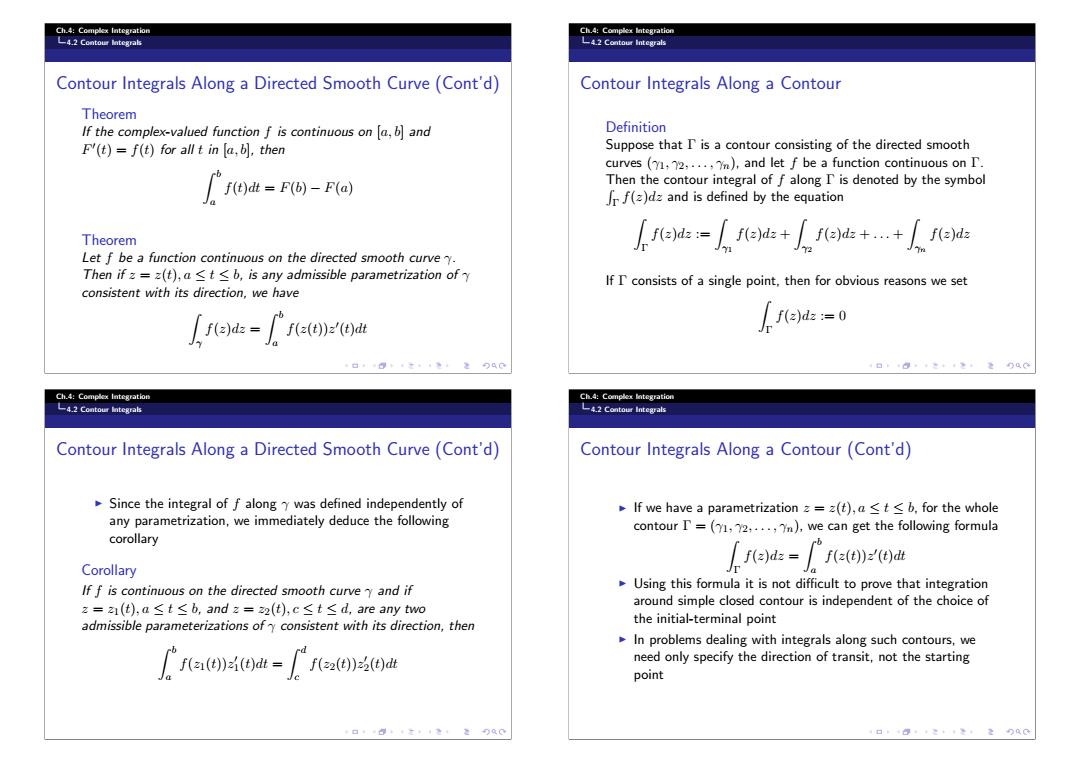正在加载图片...

Ch.4:Complex Integration Ch.4:Complex lntegration L4.2 Contour lntegrals L4.2 Contour Integrals Contour Integrals Along a Directed Smooth Curve(Cont'd) Contour Integrals Along a Contour Theorem If the complex-valued function f is continuous on [a,b and Definition F'(t)=f(t)for all t in [a,b,then Suppose that I is a contour consisting of the directed smooth curves(,2.....),and let f be a function continuous on I. f(t)dt F(b)-F(a) Then the contour integral of f along I is denoted by the symbol f()dz and is defined by the equation Theorem 人fe=fed+ f)dz+..+ f(=)dz Let f be a function continuous on the directed smooth curve y. Then if z =z(t),a <t<b,is any admissible parametrization ofy If I consists of a single point,then for obvious reasons we set consistent with its direction,we have f(=)dz= f(z(t))z'(t)dt f(z)dz:=0 Ch.4:Complex Integration Ch.年Complex lategration L4.2 Contour Integrals L4.2 Contour Integrals Contour Integrals Along a Directed Smooth Curve(Cont'd) Contour Integrals Along a Contour(Cont'd) Since the integral of f along y was defined independently of If we have a parametrization z=z(t),a <t<b,for the whole any parametrization,we immediately deduce the following contour I=(1,72,...,n),we can get the following formula corollary rb f(z)dz f(z(t))z'(t)dt Corollary If f is continuous on the directed smooth curvey and if Using this formula it is not difficult to prove that integration z=2a(t),a≤t≤b,andz=22(t),c≤t≤d,are any two around simple closed contour is independent of the choice of admissible parameterizations ofy consistent with its direction,then the initial-terminal point In problems dealing with integrals along such contours,we n()sc-ex need only specify the direction of transit,not the starting pointCh.4: Complex Integration 4.2 Contour Integrals Contour Integrals Along a Directed Smooth Curve (Cont’d) Theorem If the complex-valued function f is continuous on [a, b] and F(t) = f(t) for all t in [a, b], then b a f(t)dt = F(b) − F(a) Theorem Let f be a function continuous on the directed smooth curve γ. Then if z = z(t), a ≤ t ≤ b, is any admissible parametrization of γ consistent with its direction, we have γ f(z)dz = b a f(z(t))z(t)dt Ch.4: Complex Integration 4.2 Contour Integrals Contour Integrals Along a Directed Smooth Curve (Cont’d) Since the integral of f along γ was defined independently of any parametrization, we immediately deduce the following corollary Corollary If f is continuous on the directed smooth curve γ and if z = z1(t), a ≤ t ≤ b, and z = z2(t), c ≤ t ≤ d, are any two admissible parameterizations of γ consistent with its direction, then b a f(z1(t))z1(t)dt = dc f(z2(t))z2(t)dt Ch.4: Complex Integration 4.2 Contour Integrals Contour Integrals Along a Contour Definition Suppose that Γ is a contour consisting of the directed smooth curves (γ1, γ2,...,γn), and let f be a function continuous on Γ. Then the contour integral of f along Γ is denoted by the symbol Γ f(z)dz and is defined by the equation Γ f(z)dz := γ1 f(z)dz + γ2 f(z)dz + ... + γn f(z)dz If Γ consists of a single point, then for obvious reasons we set Γ f(z)dz := 0 Ch.4: Complex Integration 4.2 Contour Integrals Contour Integrals Along a Contour (Cont’d) If we have a parametrization z = z(t), a ≤ t ≤ b, for the whole contour Γ=(γ1, γ2,...,γn), we can get the following formula Γ f(z)dz = b a f(z(t))z(t)dt Using this formula it is not difficult to prove that integration around simple closed contour is independent of the choice of the initial-terminal point In problems dealing with integrals along such contours, we need only specify the direction of transit, not the starting point���������